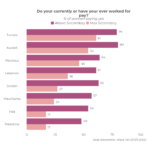In evaluating the consequences of the Arab Spring 8 years later, this paper not only focuses on the short‐term consequences of the uprisings that swept through a number of countries in the Middle East and North African region but also analyzes the long‐term prospects for democratization and development in the MENA region. The impact of the Arab Spring, despite its promises and the expectations of the rest of the world, has been dismal. While only Tunisia made a successful transition to a democratic polity with a constitution guaranteeing the basic rights of the people, the rest of the Arab Spring countries remain in the grip of the authoritarian rule, and countries such as Syria, Libya, and Yemen have been degenerated into bloody civil wars with dwindling hope of peace and freedom. On economic front, the growth has been tardy, showing little difference with countries that were unaffected by the Arab Spring. Yet, the paper concludes, echoing historian Eric Hobsbawm’s view, that revolutionary outcomes need not be judged as failure too quickly as they are likely to be partial success in the long term. The impact may be observed in the area of social opening, newer class alliances, and the emergence of a less rapacious, reformed, hybrid authoritarianism.
View External SiteTopics
- Charity2
- Corruption113
- COVID-1969
- Democracy35
- Discrimination13
- Economy225
- Education51
- Environment36
- Extremism19
- Freedoms50
- Gender Issues159
- Governance253
- Health44
- International Relations192
- Labor Market34
- Media31
- Migration63
- Political Institutions213
- Political Participation33
- Political Systems60
- Refugees6
- Religion118
- Security31
- Social Justice44
- Wellbeing2
- Youth75


